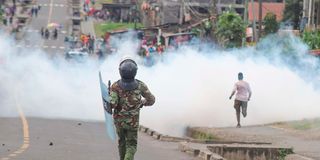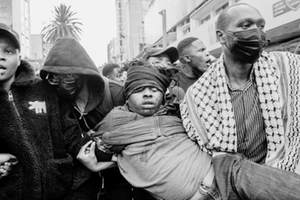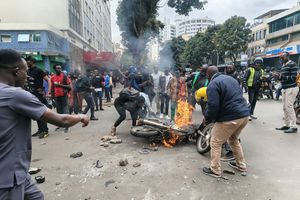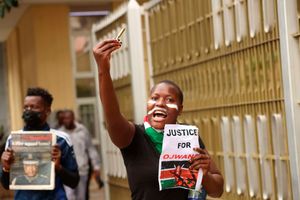
Inspector-General of Police Douglas Kanja addresses journalists on June 9, 2025 after visiting Central Police Station in Nairobi where blogger Albert Ojwang' is alleged to have died while in police custody. With him are Deputy Inspector-Generals of Police Eliud Lagat (left) and Gilbert Masengeli.
Despite years of constitutional reform, civilian oversight and activism within civil society, the struggle for police accountability in Kenya has entered a deeply troubling phase, with the country’s top police officers now at the centre of allegations of impunity.
Over the past 10 months, Inspector-General of Police Douglas Kanja and his deputies, Gilbert Masengeli (Administration Police Service) and Eliud Lagat (Kenya Police Service), have been embroiled in a series of controversies that call Kenya’s commitment to the rule of law into question.

Inspector-General of Police Douglas Kanja addresses journalists on June 9, 2025 after visiting Central Police Station in Nairobi where blogger Albert Ojwang' is alleged to have died while in police custody. With him are Deputy Inspector-Generals of Police Eliud Lagat (left) and Gilbert Masengeli.
When Mr Kanja was sworn in in September 2024, there were high expectations of a new era of professional policing.
Known for his calm demeanour and extensive experience within the force, he inherited a security apparatus under pressure from rising urban insecurity and an increasingly sceptical public regarding police conduct.
Yet within months, his tenure became defined not by reform, but by a deepening culture of contempt for the law and for the lives of those he had sworn to protect.
The IG’s aversion to the legal process was revealed in early 2025, when the High Court summoned him to explain the disappearance of seven young men who were allegedly abducted by the police at the end of 2024.
The court's intention was clear: it wanted answers from the man at the top.

Deputy Inspector-Generals of Police Gilbert Masengeli and Eliud Lagat, and Inspector-General of Police Douglas Kanja (right) when they appeared before the National Assembly Committee on Administration and Internal Security on Tuesday, May 27, 2025.
But Mr Kanja never appeared. Not even after multiple summonses, media scrutiny, and warnings of contempt charges.
Instead, he sent subordinates who offered no satisfactory explanation to the families still searching for their sons. This was not just a procedural failure, but an open defiance of Kenya’s judicial system.
A visibly frustrated Justice Bahati Mwamuye issued a final warning to Mr Kanja and the Director of Criminal Investigations, Mohamed Amin, ordering them to appear or face legal consequences, yet they still did not appear.
The image of Kenya’s top police boss ignoring a court order exposed an uncomfortable truth, but the disregard
The image of Kenya’s top police officer ignoring a court order exposed an uncomfortable truth, but this disregard for the rule of law is not confined to Mr Kanja’s office.

Police officers patrol along Moi Avenue in Nairobi on June 12, 2025 as youth protested againt the killing of Albert Ojwang.
In late 2024, his deputy in charge of the Administration Police Service, DIG Masengeli, was similarly accused of contempt.
In September of that year, the High Court found him guilty of failing to respond to summonses regarding the disappearance of activists Bob Njagi and the Longton brothers, who were all last seen in the custody of officers under his command.
The court sentenced Mr Masengeli to six months in prison. However, the situation turned into a farce when, rather than being arrested, he continued to attend official functions and direct operations, and even enrolled on a leadership course.
The court granted him a week-long reprieve before serving the sentence, a decision that critics interpreted not as leniency, but as evidence of political interference.
Civil society groups, including the Independent Policing Oversight Authority (Ipoa), expressed alarm.

An anti-riot police officer goes after a protester in Nakuru City on June 10, 2025.
Ipoa condemned Masengeli’s actions as 'unlawful' and dangerous, warning that ignoring a High Court order undermines the very foundation of justice.
The judiciary, which was already under pressure, was further shaken when Justice Mwamuye, who had delivered the contempt ruling, was suddenly stripped of his police security detail.
As anger simmered over the apparent emasculation of the Judiciary, another scandal erupted, this time involving Deputy Inspector-General of Police (DIG) Eliud Lagat. He stepped aside earlier this week following civil unrest and mounting pressure from human rights groups over the death of 31-year-old Albert Ojwang.
On June 7, 2025, Ojwang — a blogger and teacher — was arrested at his father’s home in Homa Bay County and transported to Nairobi, where he died in police custody. His alleged crime was publishing content implicating Mr Lagat, and Mr Kanja confirmed that he was the complainant.
The police initially claimed that he had sustained fatal injuries by hitting his head against a cell wall, but an independent autopsy revealed extensive bruising around the neck and signs of blunt force trauma to the head, indicating torture. The cause of death was listed as neck compression and head injury.
President William Ruto described the killing as a "regrettable incident", acknowledging for the first time that Ojwang had died "at the hands of the police".

A police officer aproaches demonstrators along Harambee Avenue in Nairobi on June 12, 2025 during protests over the death of blogger Albert Ojwang, who died while in police custody.
According to the Missing Voices Coalition, at least 352 Kenyans have been killed in extrajudicial killings since 2022.
Of these, 130 occurred during former President Kenyatta’s tenure before August of that year, when President Ruto took over. Since then, a further 222 deaths have occurred: 118 in 2023 and 104 in 2024. Additionally, 87 people have been forcibly disappeared, 55 of them in 2024 alone, mostly during the anti-Finance Bill protests. This highlights a disturbing trend of state-linked violence.
The most recent incident of police brutality occurred on Tuesday during protests in Nairobi’s city centre demanding justice for Ojwang. A police officer shot a mask vendor at point-blank range.
Elsewhere in the city, gangs of armed thugs, reportedly working in collusion with the police, mugged, assaulted and brutalised innocent civilians while uniformed officers looked on.
A senior official in the Inspector-General’s office, speaking on condition of anonymity, claimed that they suspected "elements of sabotage within the police ranks aimed at tainting the good work of officers".







